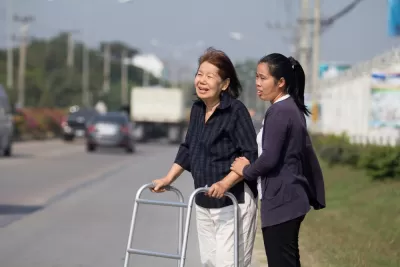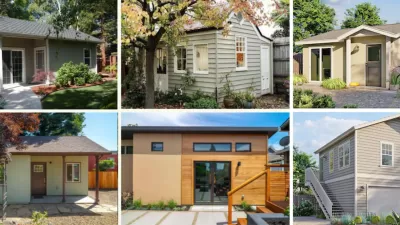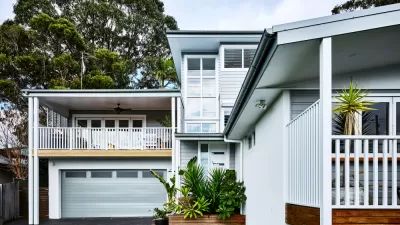Many cities aren't planning and designing for their aging residents, despite a world full of examples to model from, according to a new report from the Milliken Institute.

Jason Plautz shares news of new report from the Milliken Institute Center for the Future of Aging that documents the accommodations made for seniors living in cities, like safe and affordable housing, walkable neighborhoods, and access to healthcare.
The "Age-Forward Cities for 2030" [pdf] report finds that about "eight in 10 U.S. residents 65 and older live in metropolitan areas, and adults over 60 are expected to account for about half of urban consumption growth by 2030," according to Plautz.
"The report says that many American cities aren’t doing enough to prepare for the needs of an aging population, including a failure to acknowledge 'the interconnection between their aging communities and their cities’ economic health and sustainability.'"
The report also notes that some cities are making progress, especially by crafting age-friendly strategic plans, like those in Pittsburgh and Columbus. The report also identifies land use regulation reform that allows accessory dwelling units in single-family neighborhoods as an important step toward age friendliness. "And trends like new urbanism, complete streets and Vision Zero programs are also strategies that will help seniors, the report finds," according to Plautz.
FULL STORY: Report: Cities are 'ground zero' for seniors, but lack accommodations

Maui's Vacation Rental Debate Turns Ugly
Verbal attacks, misinformation campaigns and fistfights plague a high-stakes debate to convert thousands of vacation rentals into long-term housing.

Planetizen Federal Action Tracker
A weekly monitor of how Trump’s orders and actions are impacting planners and planning in America.

San Francisco Suspends Traffic Calming Amidst Record Deaths
Citing “a challenging fiscal landscape,” the city will cease the program on the heels of 42 traffic deaths, including 24 pedestrians.

Adaptive Reuse Will Create Housing in a Suburban Texas Strip Mall
A developer is reimagining a strip mall property as a mixed-use complex with housing and retail.

Study: Anti-Homelessness Laws Don’t Work
Research shows that punitive measures that criminalized unhoused people don’t help reduce homelessness.

In U.S., Urban Gondolas Face Uphill Battle
Cities in Latin America and Europe have embraced aerial transitways — AKA gondolas — as sustainable, convenient urban transport, especially in tricky geographies. American cities have yet to catch up.
Urban Design for Planners 1: Software Tools
This six-course series explores essential urban design concepts using open source software and equips planners with the tools they need to participate fully in the urban design process.
Planning for Universal Design
Learn the tools for implementing Universal Design in planning regulations.
Heyer Gruel & Associates PA
JM Goldson LLC
Custer County Colorado
City of Camden Redevelopment Agency
City of Astoria
Transportation Research & Education Center (TREC) at Portland State University
Jefferson Parish Government
Camden Redevelopment Agency
City of Claremont





























